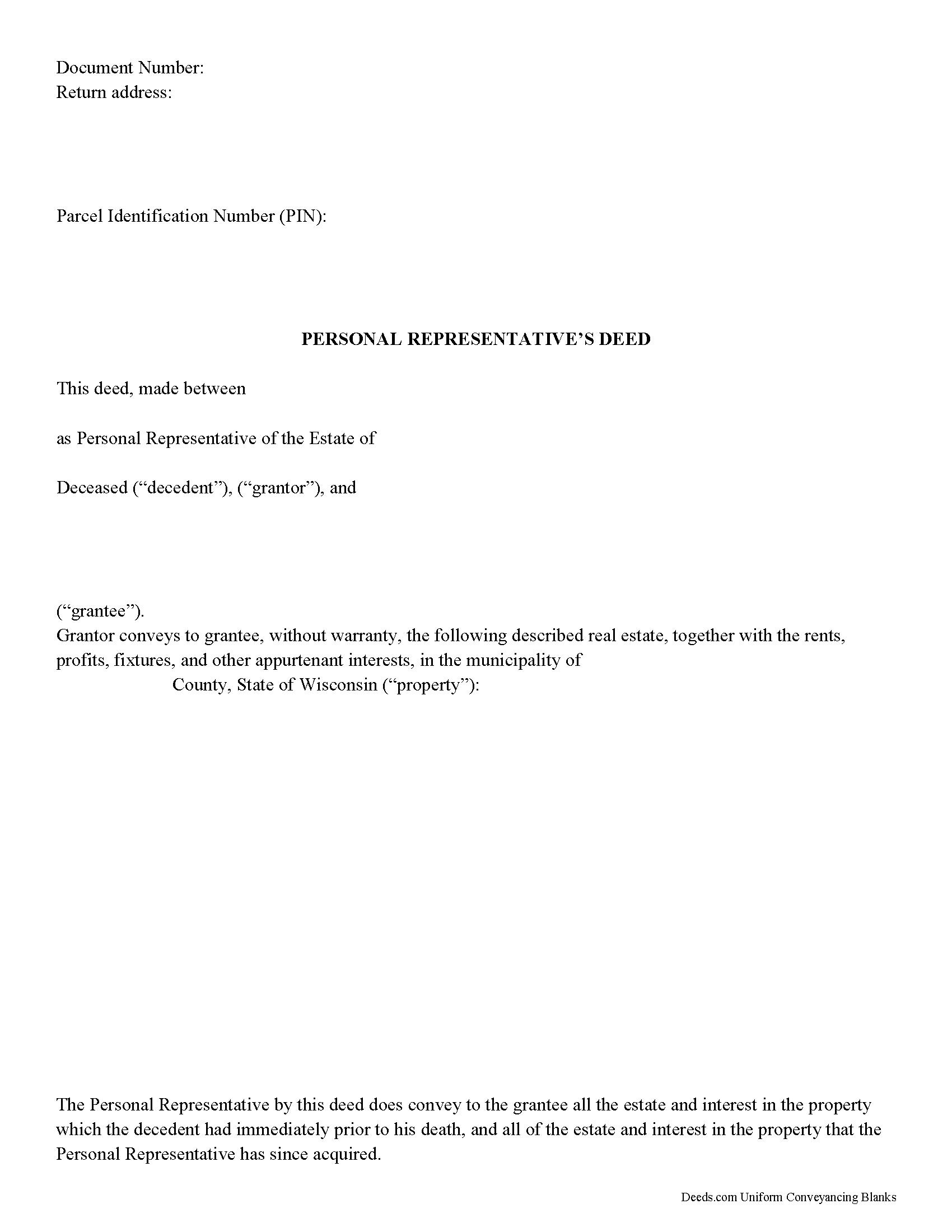Download Wisconsin Personal Representative Deed Legal Forms

Wisconsin Personal Representative Deed Overview

Transfer or Sale of a Decedent's Real Estate in Wisconsin
At its most basic, probate means to prove a decedent's will. The term "probate," however, is frequently used to describe the legal process of estate administration, which includes intestate estate succession in addition to probating wills. Estates are called intestate when the decedent (deceased person) does not leave a will. Probate ensures that a decedent's estate is lawfully transferred pursuant to the provisions of his will or to the state's laws of intestate succession.
Property that does not transfer by means of a survivorship or beneficiary designation is subject to probate. Estates requiring formal or informal probate involve the appointment of a personal representative (PR), a fiduciary appointed by the court to administer the estate in accordance with Wisconsin's Probate Code, located at Chs. 851-882 of the Wisconsin Statutes. This article will focus on informal administration; formal administration may be necessary depending on such factors as specifications in the will and whether all persons having an interest in the estate agree on the administration. Consult a lawyer with questions.
The first step to administration is opening the estate by submitting a petition for administration in the circuit court of the county where the decedent resided at the time of death. If there is a will, it must be delivered to the probate registrar. If the testator (person making a will) has filed the will with the court for safekeeping, the court shall contact the person named in the will to administer the estate (Wis. Stat. Sec. 856.03). Upon petition, the court will set a time for proving the will (if applicable), determining heirship, and appointing a personal representative (Sec. 856.11).
To evidence the authority of a PR to act on behalf of the estate, the court grants Domiciliary Letters to the qualifying person. The person named in the decedent's will has priority in appointment, followed by any person interested in the estate or the person's nominee, under discretion of the court (Sec. 856.21). With the issuance of letters, the PR is granted the general powers and duties of a personal representative under Ch. 857, Wisconsin Statutes, to administer the estate as required by law.
Among the PR's powers is the power to "sell, mortgage or lease any property in the estate without notice, hearing or court order" under Sec. 860.01, unless restricted or prohibited by the decedent's will (Sec. 860.11). The beneficiary of property specifically devised to him by the decedent must join in the sale of such property (Sec. 860.11(2)). If the will contains any such limitations as to the sale of real property, yet the PR is unable to pay allowances, expenses of administration, or claims on the estate within those limitation, he can petition the court for sale (Sec. 860.11(4)).
To sell or transfer an interest in real estate, the PR executes a personal representative's deed. A PR deed passes title to the named grantee free and clear of the rights of creditors that have been filed and allowed in the estate under Ch. 859 (Sec. 860.05). The PR has no statutory power to make warranties in any sale of real estate binding on the PR or on the estate (Sec. 860.07). The deed conveys all the estate and interest in the property the decedent had immediately prior to his death, and all the estate and any interest in the property the PR has since acquired.
A lawful deed should meet the requirements for content established at Sec. 706.02, identifying the parties and the land involved, the interest conveyed, and any conditions. The grantor must sign and have the deed properly acknowledged under Sec. 706.06. All deeds in Wisconsin require the name of the person who drafted the instrument and full legal description of the property and meet statutory and local standards for formatting recorded instruments (Sec. 59.43).
Record the deed in the office of the register of deeds in each county where the property is situated. Conveyances of real property offered for recording must be accompanied by receipt of an electronic real estate transfer return or note an exemption on the face of the document 706.05(12)). Exemptions to the real estate transfer fee are codified at Sec. 77.25, and include transfers by will, descent, or survivorship (Sec.77.25(11)).
Consult an attorney about personal representative's deeds and informal probate procedures in Wisconsin, as each situation is unique.
(Wisconsin PRD Package includes form, guidelines, and completed example)